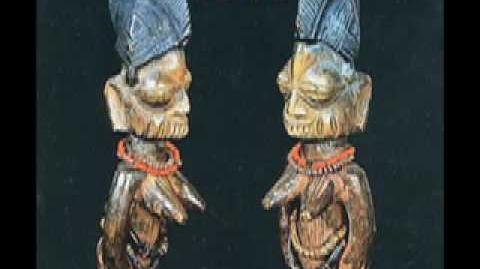The Brotherhood Of Breath was a big band created, in the late 1960s, by South African pianist and composer Chris McGregor (1936–1990), essentially an extension of McGregor's previous band The Blue Notes. The Brotherhood of Breath included many members of the South African expatriate community resident in London, including McGregor himself, Louis Moholo, Harry Miller, Mongezi Feza, Dudu Pukwana, (occasionally) Johnny Dyani; and many of the free jazz musicians who were based in London at the same time: Lol Coxhill, Evan Parker, Paul Rutherford, Harry Beckett, Marc Charig, Alan Skidmore, Mike Osborne, Elton Dean, Nick Evans, and John Surman. The personnel was fluid, depending on who was available. The music resembles a mixture of the hard-driving blues of Charles Mingus and the wild experimentalism of Sun Ra, but retains a unique feel due to the South African influences and the intelligent arrangements.... (Read more at Wikipedia.)
Links to Peel[]
The Brotherhood of Breath did two Peel sessions, in 1971 and 1972, at a time when the DJ and his producer John Walters seemed sympathetic to new music from the British jazz scene, and Walters himself produced the band's first session.. It included musicians associated with bands Peel lliked, including Elton Dean, Marc Charig and Nick Evans, who had been members of Soft Machine and had played on the Softs' second 1969 session for Top Gear. But the Brotherhood of Breath grew out of the Chris McGregor Group, which consisted of the South African musicians mentioned above. They had auditioned for the BBC, drawing hostlie comments from the listening panel ("a cacophony", "full of inaccuracies") but were eventually allowed to record sessions for BBC jazz programmes. They also attracted the attention of record producer Joe Boyd, who, as he recounts in his book White Bicycles, signed them to his Witchseason Productions company and produced an album by them, Very Urgent, for Polydor Records in 1968. Although Peel isn't known to have played anything from it on air, he may well have heard it - especially considering that Joe Boyd's Witchseason stable also included artists he liked, such as the Incredible String Band and Fairport Convention.

Brotherhood of Breath - MRA
Joe Boyd also produced the first Brotherhood of Breath LP, which was released on RCA Records' "progressive" label Neon and promoted as progressive jazz-rock, rather than as jazz, and Chris McGregor was interviewed by a young Kid Jensen on his late-night Radio Luxembourg show Dimensions. The album wasn't a commercial success, but its most South African-sounding tracks, "Andromeda" and "Mra", picked up some radio airplay on Radio 1's Sounds of the Seventies shows, as they were close to the style of popular London-based African bands of the era like Osibisa. After that, however, the Brotherhood of Breath disappeared from Peel's playlists, and became a respected act on the British and European jazz circuits during the 1970s and 1980s. McGregor and his musicians are now recognised as pioneers of South African jazz, but the pianist himself is known to a wider public for his memorable solo on "Poor Boy", from Nick Drake's album Bryter Layter.
Festive Fifty Entries[]
- None
Sessions[]
- Two sessions. No known commercial release.
1. Recorded: 1971-07-13. First broadcast: 24 July 1971. Repeated: 25 September 1971
- Union Special / Call / Kongi Theme / Think Of Something / There Is A Spirit (not broadcast)
2. Recorded: 1972-06-13. First broadcast: 20 June 1972. Repeated: none
- Do It / Song Title / The Serpent's Kindly Eye
Other Shows Played[]
- 17 July 1971: Union Special (LP - Chris McGregor's Brotherhood of Breath) Neon[1]
See Also[]
External Links[]
References[]
- ↑ No recording of this show has yet been found, but on the Top Gear of 24 July 1971, Peel introduces the session version of this track and mentions that he'd played the LP version the previous week, as the closing track of the show..
